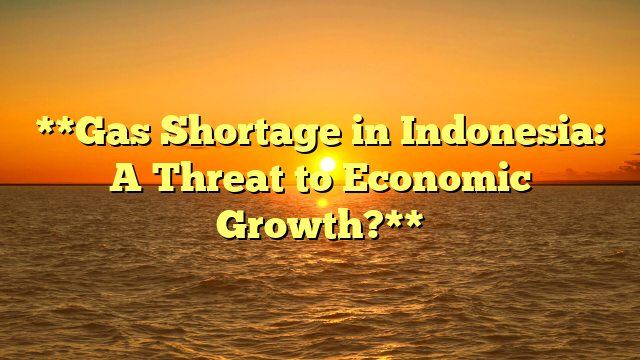
Indonesia, one of Southeast Asia’s largest economies, is facing a growing challenge in its energy sector: a persistent natural gas shortage. Despite having abundant gas reserves, the country is struggling to meet domestic demand due to declining production, infrastructure constraints, and export obligations. As industries, power plants, and households grapple with supply disruptions and rising prices, concerns are mounting over how this shortage could impact Indonesia’s economic growth. If left unaddressed, the gas crisis could slow industrial expansion, increase energy costs, and weaken the country’s overall economic stability.
One of the key reasons behind Indonesia’s gas shortage is the natural decline in production from aging gas fields. Major gas-producing regions, such as East Kalimantan and Sumatra, have been operating for decades and are now experiencing reduced output. While new gas exploration projects are underway, they require years of investment and development before production can begin. This delay has created a supply gap, forcing Indonesia to either cut domestic consumption or increase expensive imports to meet demand.
The gas shortage is particularly problematic for Indonesia’s industrial sector, which relies heavily on natural gas for manufacturing, petrochemicals, and power generation. Industries that depend on a steady gas supply are now facing higher operational costs, leading to reduced production and potential job losses. keongtogel and medium-sized enterprises (SMEs), which form the backbone of Indonesia’s economy, are especially vulnerable, as they lack the financial resources to absorb rising energy prices. If these businesses are forced to scale back operations, it could weaken economic growth and reduce employment opportunities.
Additionally, power plants that rely on gas to generate electricity are struggling to maintain stable energy supplies. As demand for electricity grows, a lack of gas availability could lead to power shortages, disrupting business activities and everyday life. To compensate, Indonesia has turned to alternative fuels such as coal, which, while more abundant, raises environmental concerns and contradicts the country’s commitments to reducing carbon emissions. The shift back to coal could also make Indonesia’s energy sector less attractive to foreign investors, especially those prioritizing sustainable and green energy initiatives.
Another major factor contributing to the gas crisis is Indonesia’s long-term export commitments. In previous decades, the government signed contracts with major gas-importing countries, such as Japan, South Korea, and China, prioritizing exports over domestic consumption. While these contracts have generated substantial revenue, they have also restricted the amount of gas available for local industries. Renegotiating these deals is complex and could harm Indonesia’s reputation as a reliable energy supplier. However, without adjustments to export policies, the domestic gas shortage is unlikely to improve.
To address this crisis, Indonesia must take immediate steps to secure its energy future. Investments in new gas exploration, the expansion of domestic pipeline infrastructure, and a reassessment of export commitments are essential. Additionally, encouraging a transition to renewable energy sources, such as solar and geothermal power, could help reduce dependence on natural gas in the long term.
In conclusion, Indonesia’s gas shortage poses a significant threat to economic growth by driving up energy costs, disrupting industries, and reducing investor confidence. While short-term solutions like LNG imports may provide temporary relief, a long-term strategy focused on domestic energy security and diversification is necessary to sustain economic stability. Without decisive action, the gas crisis could hinder Indonesia’s progress toward becoming a stronger and more resilient economy.





